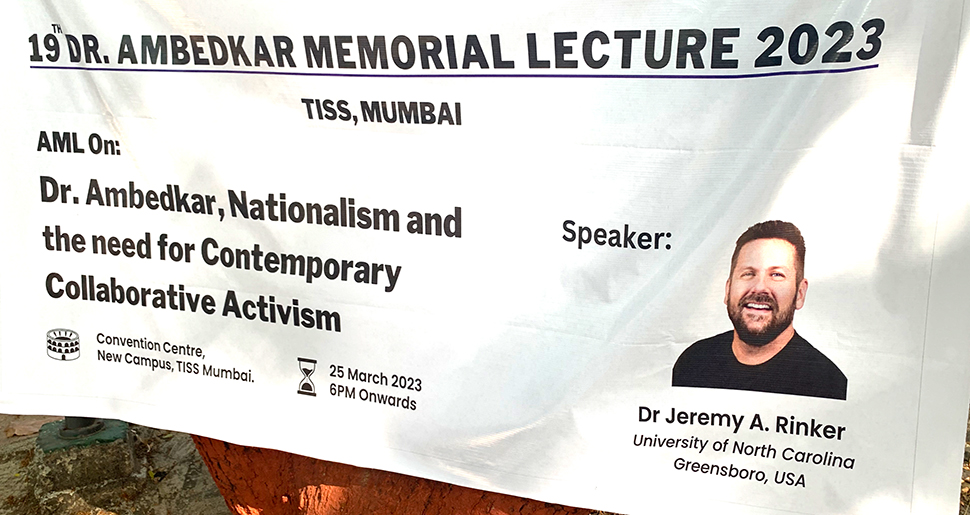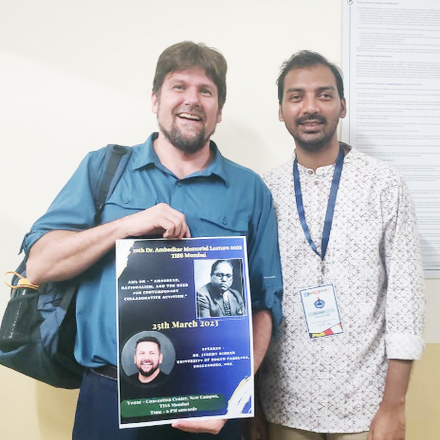
Peace and Conflict Studies Associate Professor Dr. Jeremy A. Rinker, who recently received a Fulbright-Nehru Scholar Program Award, spent the spring semester 2023 teaching and researching on caste conflict in Pune city, Maharashtra State, India.

The Fulbright-Nehru award is a joint venture between the U.S. government and the Indian government and allowed Rinker many opportunities to engage with all levels of Indian society. Rinker has been teaching at the Symbiosis School for Liberal Arts, a private, four-year liberal arts university, one of only a few in India.
Despite being born into an ‘untouchable’ caste, Ambedkar is seen as a Buddhist bodhisattva to his many followers. Bestowed with this honor, Rinker commented on not only the stellar social work students at TISS/Mumbai, but their “deep grasp of India’s social reality.” Such social awareness is critical for India, given the complex and increasingly polarized social realities that the country currently faces.
Upon the backdrop of nationalist rhetoric, Hindutva ideology, and identity-based politics, Rinker called for a close reading of Ambedkar’s thoughts, especially as they relate to fraternity.
In his talk, “Ambedkar, Nationalism, and the Need for Contemporary Collaborative Activism (Movement?): Why Intra and Inter-caste Contact Matters,” Rinker challenged his audience of more than 1,000 people to embrace “collaborative anti-caste activism.”
To support this call, Rinker drew on Ambedkar’s prolific writings and speeches to claim that, “Ambedkar’s thought was in no way exclusionary, but rather inclusive and pro-social.” Ambedkar was a fierce critic of caste, but not of the people who perpetuate the unjust caste system. For Ambedkar, caste was a state of mind and Buddhism, which trained adherents to see the world as it truly is, provided an important methodological and philosophical approach to achieve the annihilation of caste. Ambedkar was a peacebuilder.
In his undelivered speech, “Annihilation of Caste,” Ambedkar says: “What sustains equality and liberty is fellow feeling. What the French Revolutionaries called fraternity. The word fraternity is not an adequate expression. The proper term is what the Buddha called Maitri… If in democracy liberty does not destroy equality and equality does not destroy liberty, it is because at the basis of both there is fraternity.
Fraternity is therefore the root of democracy.” Fraternity is, for Ambedkar, the fulcrum holding up liberty and equality in any democratic state. Rinker’s AML reminded his listeners of this important fact and called on the vast universe of Ambedkarite anti-caste movements to come together and work to educate, organize, and agitate collaboratively to be a bulwark against anti-social and exclusionary forces of nationalism and identity-based victimhood.
Ambedkar “never shied away from confrontation, but he also saw the need to engage, negotiate, share, and dialogue with those that were not in full agreement with him” Rinker said.
Ambedkar’s prolific archive is slowly being unearthed and given new and critical appraisal in the modern Indian polity. Ambedkar’s belief was that all political revolutions were proceeded by social and religious revolutions. Much work remains to be done in the field of human peace, and many threats to social change in India are lurking around the corner. Still, Ambedkar’s life and writing presents an optimistic example of what is possible.
Rinker, who has been to India several times, also remains optimistic. In studying caste conflict
and exploring what can be done to overcome its’ traumatic legacies, Rinker believes that
Ambedkar can be an important beacon for positive nonviolent social change. His opportunity to deliver the Ambedkar Memorial Lecture allowed him to publicly call for more intra- and inter- caste dialogue.
A strong believer in the need for contact and engagement across difference, Rinker is studying the ways to create effective space and structure to explore collective traumas as a means to shifting narratives and discourses of exclusion in India and the world.
Frameworks for inclusive peace remain possible, even in our polarized and divided world.
The Ambedkar Memorial Lecture (AML) at TISS/Mumbai was inaugurated in 2003 and was the culmination of a long fight between the TISS/Mumbai SC/ST Employees Welfare Association and its allies. Despite a hostile environment in the 1980s and 1990s for students, faculty, and staff at TISS/Mumbai coming from marginalized communities, the welfare association always celebrated B.R. Ambedkar’s birthday on April 14.
From these early collaborative actions on TISS/Mumbai campus, the AML lecture was created. With the primary goal of honoring “Dr. Ambedkar’s intellectual contribution to the academic world and to society at large,” the AML is a chance to highlight Ambedkar’s relevance today.